|
Interview conducted May 09 2014 Interview published May 21 2014 |
After having some difficulties with the connection, Bleeding Utopia's 3 fixed members Andreas Morén, David Ahlén and Joakim 'Jocke' Bergros called me 20 minutes past our appointment this Friday night for something that turned out to be a pleasant conversation with a band that has big plans. The band's second effort, Darkest Potency was released on April 30th and with tons of hard work, perhaps their visions will come to life, as they're about to start a reputation in the world of heavy music.
![]()
Tobbe: You're not an established band yet, so tell us a little about your background?
Andreas: The actual embryo of the band started in 2003, when I had a personal little side project and I wrote a few songs that didn't fit the other bands I was involved with. I put that aside in 2005 maybe and when I and our nowadays former drummer [Lawrence Dinamarca] disbanded Astral Carneval in 2009, we felt that these songs, and some new shit, was something we wanted to work with. I gave David a call, a guy I've known since I was a sperm, sort of. We have played for many years together and he wanted to join us. I also called our nowadays former singer [Henrik Wenngren], who we also knew. Jocke joined in April 2010 and that's when we really became Bleeding Utopia, you know. We recorded a 4-song promo in June 2010. We began to search for gigs and received quite a few good reviews. Around Christmas in 2010, we had several songs, so we decided to record a full length album to see if someone was interested. The record was done in like summer of 2011 and an Italian label [Wormholedeath] approached us and, which after a few delays and other shit, released it in April 2012. (David:) It was supposed to be released in September 2011. (Andreas:) Totally insane people, those ones. Italian's best ability isn't time, you know. We did a Scandinavian tour in connection to that album release and after that our drummer left the band, because he lived in another city and he had 2 other bands [Carnal Forge and Loch Vostok] and he's also a single dad, so he needed to be there for his kid. The rest of us decided to bury ourselves in the studio and write songs for another album, and now we're here.
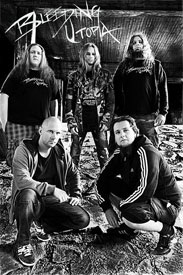 Tobbe:
How would you describe the music on Darkest Potency?
Tobbe:
How would you describe the music on Darkest Potency?
Jocke: The difference between the first album and this one is rather radical, in terms of both songwriting and production. It feels like we found our style now. (Andreas:) On the first record I wrote, during a long time, 9 songs out of 10 and we pretty much recorded that one because we had many songs available. With this new record, we worked together for like 6 months and really did everything as a group. We had riffs, we had the entire feeling and we tried many things. This is more a collective album and this is what we will sound like. (David:) In terms of type of music, we have never been out to do something innovative. We grew up and listened to and loved this type of metal. We're not trying to differ ourselves at that point, and we play what we want to play. (Andreas:) We like pretty much everything, from the beginning of the 80's and to the middle of the 90's. We're all born in the early 80's, so we grew up with the second wave that came in the early 90's with At The Gates, In Flames, Deicide and Dissection. We have taken that and mixed it with some of our personal American heroes and done it in our own way. Not a new way, in our own way.
Tobbe: You play some kind of melodic death/thrash metal and you just told me what your inspiration comes out of, but did you ever consider to play a different type of metal?
Andreas: This is what we are able to play and this is what we want to do. When you pick up the guitar, a certain type of riffs comes out. You have a certain melodic sense and when I, who write a lot of the lyrics, write something, I see a film before me and I think of what the soundtrack would be to that film and then it comes out like this. This is what I've listened to and this is what has inspired me and this is my melodic sense. (David:) When it comes to this music, we feel like at home. When we write, we land where we feel safe. (Andreas:) Our first record was highly inspired by the old Gothenburg scene, while on the new album, we have different things to get inspiration from. In terms of atmosphere, Behemoth has come out as inspiration and perhaps Black Dahlia Murder and White Chapel also, but we try to do it in a Swedish way. [Asking his bandmates:] Is that the way to put it? (David and Jocke:) [both] In our own way. (Andreas:) Yes, exactly. Then it becomes a sort of Swedish way, almost.
Tobbe: The solo guitar in your songs creates a melodic atmosphere to the music. It has kind of its own melody and why do you choose to have that element?
Andreas: On the record I play the small solos, so to speak, and Jocke plays the bigger, ambient and epic solos. (Jocke:) Many bands focus on technique nowadays and I'm not that technically set, so this feels pretty safe. [laughs] (Andreas:) When we wrote solo stuff and so for the new record, we talked about that playing fast is fun, but also doing something that works as a song in the song. If you think of an Amon Amarth solo, it's not very technical and it's no fast stuff. It's an atmosphere. And the same with like Behemoth solos, it's not really a guitar solo, but more something that sticks out, like a song in the song. And also if you think of old Randy Rhoads solos. They are not over technical and he also wrote like songs in the songs, you know. (Jocke:) It's also easier to relate to solos that are a little more ambient. Who thinks of something like [making humming fast tones] all day? (Andreas:) You want to stand there in front of 50000 people in Wacken and hear the people humming to the solos and not hear them go [making humming fast tones]. It would be really strange. I think that since we don't have that much synthesizers, strings and choirs in the background, we try to create atmosphere through the solos, like creating a feeling. (Jocke:) Try to keep it simple, not too difficult, so people have something to relate to.
Tobbe: You probably reach a broader audience with this matter as well.
Andreas: Yes, exactly. When we started to write for the record, we had pretty cluttering riffs. (David:) We cleaned things up a lot. (Andreas:) Oh yes. We made it more simple and straight ahead, so that we also are able to move on stage, without making a mess. Really just go for more feeling, atmosphere and slaps in the face. We wanted to simplify things. It wasn't that we thought that if we simplified things, we would be the next In Flames. It was more that if we simplify things, we are able to play better.
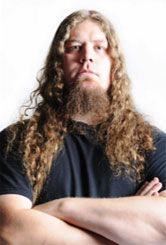 Tobbe:
Why should people who listen to this type of music, buy your record in
favor of another record? Perhaps it's not the easiest question to answer,
out of your own perspective, because you think that this is the best record
in the world, I reckon.
Tobbe:
Why should people who listen to this type of music, buy your record in
favor of another record? Perhaps it's not the easiest question to answer,
out of your own perspective, because you think that this is the best record
in the world, I reckon.
Andreas: I you want the fast stuff, the heavy, a lot of grind and blast beats and so, you'll get a share of that. If you want some grand choruses, which are easy to learn the lyrics of in no time, you'll get a share of that as well. People who wants heavy music, should buy this album. People who wants to shout through the choruses, should buy this album. People who wants epic solos, should also buy the album. (David:) And everyone who likes "Fredagsmys" ["Cozy Fridays". Swedish expression. Not translatable], should also buy this album.
Tobbe: That will be lots of records to sell in the end. Let's go back to the album's production. I think it's powerful and the overall sound is great. What were your thoughts when you picked producer [Jocke Skog] and what were you looking for as a whole?
Andreas: We worked with him on the previous record and we created a great relation to him. We have talked with him pretty often and we think alike with productions and so. Everything should have its place and at the same it should be dirty, gritty and violent. I mean, we like big productions, but there are many metal bands that want everything as well-polished as possible. (David:) With a plastic sound. (Andreas:) We don't want that, but everything should have its place, but still there should be a lot of violence, with broken arms and so. (David:) Like old The Crown, but cleaner. (Andreas:) Dirty, but yet like clean. We have gotten to know him well and he did the new Feared album and he did a lot with Clawfinger and as we have talked to him and also hung out a lot, this turned out a no-brainer, that he should take care of everything. (David:) He wasn't hard to convince either. (Andreas:) No, he wasn't. We didn't sit at home and thought about who we should get in touch with. It was an obvious choice and we have the exact same visions.
Tobbe: So what are your goals with this new album, both on short terms and on a long time basis?
Andreas: In short terms, Billboard top 10, but that will be tough. (David:) We have to make it visible. (Andreas:) Yes, we have to make it visible, to as many as possible. Everywhere, like the whole world. We will work really hard, both ourselves and then Rambo Music and Sony Music will help us in Sweden. Then we have recently signed a booking/management/promotion contract with a German company [Agentur EAM], which will start helping us around the world, while we also will try to control a lot of things ourselves. And about the future; At this point, it's a little late for festivals this summer, but hopefully we will play Europe this fall and next spring, and we will try to play many festivals next summer. We want to, and we try to plan to, possibly next fall, go over to the States. Those are our goals and our plans and hopefully we will reach that far, if we work hard enough.
Tobbe: I will return to hard work later. It has been 10 days since the album release. Have you been given any indications whatsoever, on sales figures, you know?
Andreas: Well, people have ordered it through our site and copies have also been sent to Scotland, Norway and around Sweden. That's what we know, thus far. We don't really know what the status is at Sony yet and we probably won't know anything until 6 months maybe. As it looks now, from our bunker, we have sent out a good loot. We have contact with a distributor in the US, so we send stuff to him and hopefully he manages to sell some stuff too. For being a band that everyone hasn't heard about, so to speak, it has taken off really well. We have worked hard since November, when we and Johan at Rambo Music decided that we would release this shit in the final days of April, so we have at least tried to work in a frenetic pace.
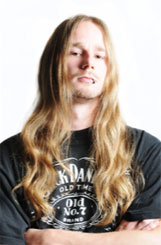 Tobbe:
Well, with most of the records released by less known bands, it's not
certain that things happen upon release. It might be a long process.
Tobbe:
Well, with most of the records released by less known bands, it's not
certain that things happen upon release. It might be a long process.
Andreas: Yes, especially since we're a rather fresh band. We've only existed for like 4 years and released 2 albums. The more we play gigs and sell, and the more reviews coming up, maybe somewhere around fall or winter, we'll start to sell more records, when people start to know about us.
Tobbe: Do you have any gigs planned at this point?
Andreas: Not at the moment. Right now we're looking for a new drummer.
Tobbe: Quite so. So why don't we talk about why you chose Kevin Talley to play on the album.
Andreas: It started around Christmas, when we were recording the guitars and so. He got in touch with us, after he had heard all the demos on SoundCloud. He liked the songs and he heard that Jocke Skog would produce the album and since Kevin played on Feared's latest album, he knows Jocke and he knows what Jocke is able to do. He felt that nothing could go wrong, with the songs that he thought were great and with Jocke as producer. He contacted us and asked us if we wanted him to do the drums and it was a no-brainer. We sent him the stuff and he learned them in a week, and recorded them in a week. We're really happy with his work. Now we have to find someone who is able to play his parts live.
Tobbe: The new record is intense and when you play gigs later on, will you try to make them varied, or will it be full throttle from start to finish?
Andreas: No, we will probably play something mid-tempo in the middle. We have talked about focusing on the new songs and at the same time use the songs from the first album that fits the best. It's maybe 4 songs that fits the new direction. We have a slower song from that one, which we can use, so we can take a rest for a while. We're such a new band, so we will play as support act and we will probably have 25-40 minutes, so why not go up on stage and kick the audience in the balls and hit them in the face for 30 minutes and then walk off stage and then the audience won't understand what happened. I have since long had a thing when we played live; the audience should not remember the bands that have played before us and the bands following us should feel that it's tough to enter the stage. That's my vision and we try to go there.
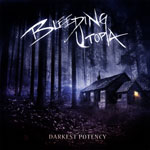 Tobbe:
How do you look at your opportunities to become something outside of Sweden?
Maybe it will start there, but you never know, so what are your thoughts?
Tobbe:
How do you look at your opportunities to become something outside of Sweden?
Maybe it will start there, but you never know, so what are your thoughts?
David: Our best opportunities are probably outside of Sweden. (Andreas:) To sound a little Swedish as a Swedish band is always tough in Sweden. If a band from abroad sounds Swedish, they will get embraced because they sound Swedish. If you go down to like Germany, Spain, Italy and especially South America, who has given us great response, they are overwhelmed by Swedish bands. We haven't seen so many reviews of the new album from abroad yet. The latest album wasn't that hot in Sweden, but especially in Germany, Spain, South America and the US, it was well received and we had many interviews, radio-time and promotion. If we do 10 gigs in Germany or 10 gigs in Sweden, I believe the gigs in Germany will generate more. When we now have signed the contract with a booking company, which hopefully will make things happen, I think we will get good response out there. We have around 9 million inhabitants in Sweden and how many of them listen to extreme metal? Then we go to Germany and they have 9 million people in Berlin [Really?], so it's a different approach. When I've been to concerts abroad, the audiences differ a lot when comparing to Sweden. The Swedish audiences are like the music police and when we've been abroad, we have been received very well, because we're not from around. In Sweden it's like a half circle in front of the stage and the rest have their arms crossed, if they haven't heard the band. With this record we have gotten good response from Sweden as well, so we hope that Sweden will receive this with open arms.
Tobbe: If you look forward. Do you have any goals for the coming 5 years or so?
Andreas: We have talked a lot about that when we win the lottery, we're set to go. (David:) Especially, we want to go out and play as much as possible. (Andreas:) Yes, go out on tours. We will probably play gigs as support act for this record and maybe in 1½-2 years we will release an album again. By then we have played gigs enough to get bigger support slots and at the same maybe headline a few shows and then hopefully go over to the States as well. Our goal is to have some sort of income in a couple of years, so we will be able to play more music and work less with our boring jobs.
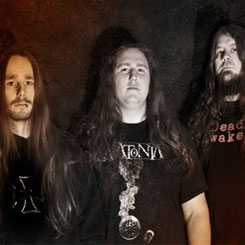 Tobbe:
As with most other bands, you have jobs and you aren't teenagers anymore,
so how do you combine your music, work and private life in best possible
way? It's not easy to tour for 2 months if you have a job or family.
Tobbe:
As with most other bands, you have jobs and you aren't teenagers anymore,
so how do you combine your music, work and private life in best possible
way? It's not easy to tour for 2 months if you have a job or family.
David: We have no private life. (Andreas:) I'm the only one that has a wife and she's like me. She's not into music, but she's like me, and no one has any kids, and we will probably quit our jobs if things start to happen. (David:) Our private life is ruled by the band's schedule. (Andreas:) Yes, exactly. We work and after that, on our spare time, 90 percent is about the music. (Jocke:) Work is right now a temporary necessity. (Andreas:) We are full-time musicians that have to work a little extra. (David:) And not the other way around.
Tobbe: Don't tell your boss tomorrow, guys. You have played in other bands before, so what makes Bleeding Utopia a band to really go for, compared to the other bands?
Andreas: I think that it's a maturity thing. We're at the same level, very immature. (David:) We have the same thinking, the same visions. (Andreas:) And we work well together and, just like you said, we're not youngsters anymore. Me and David have played together since '94 or '95. We know each other really well and we have played in bands without the other as well. It's like when you have had many jobs, you know what you want to bring to the next band and what you don't want to bring. We have talked a lot about how we want to work and everybody has had the same vision. When our former drummer, Lalle, wasn't able to share our visions, and put in all time to the band since he wanted to be more of a father, it was pretty natural that he stepped down. There was no ugly words when he left. And our old singer, Henrik, also became a father. It was a rather natural step, since they didn't share the same visions as we did. If we're out touring, we will miss out on anniversaries with the wife, we will miss birthdays and we will miss the Eurovision Song Contest. (David:) No. (Andreas:) We are all rather aware of this matter. You have to work with the band as it is a business and we are freelancers until we are able to employ ourselves. If we want to sell something, sell ourselves and to work with this, we must run it as you run a business. We are all into doing what's necessary.
Tobbe: Not many bands sell a lot of records anymore, so you have to sell a whole product, not only records.
Jocke: That's why we want to go out and play a lot too. (Andreas:) And sell shirts and stuff. We want to sell merchandise that we will be remembered for. We have made condoms with our album cover printed on them.
Tobbe: Hopefully I won't see those when they're set to action.
David: Don't count on it. (Andreas:) We're so vicious, so we have pierced a hole in every one. We will use them as giveaways and if people get condoms, hopefully someone will remember which band gave them one. And the same with live performances and it's important that you include the whole package. We won't use corpse paint or dress up like Ghost. Not to put anyone down, but I think that the hype around Ghost wouldn't be as big if they weren't so surrounded by mystique. We try to make people remember us in the best possible ways, with different merchandise, stylish merchandise and really kick people's asses on our gigs. The best publicity is people talking to other people about a band, like if somebody has bought a nice shirt. And if our fans want to talk to us, we will spend time with them.
Tobbe: It's a killing competition nowadays.
Andreas: Yes, definitely and you have to handle things right. Everyone that spends money and comes to our gigs is a customer, like any customer at a newspaper stand or in a grocery store. The customers should be able to get the best raw material, so that they will return. And it's the same thing with a band, in order to make them come back.
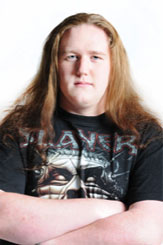 Tobbe:
What is the hardest part of getting a band to function properly?
Tobbe:
What is the hardest part of getting a band to function properly?
Andreas: People not answering their text messages. (David:) No one mentioned, Andreas. (Andreas:) The hardest part is, that if you're for instance 5 guys in a band and like with us, 3 of us are ready to go all in and some others tell us that they have to go shopping instead. You know, that you have something that is holding you back and doesn't share the same vision. It's like a relationship and if you have a girl that doesn't like you, it won't work. You have to have fun and have the same kind of humor and puerility. (David:) And you have to have structure. If we say that we will rehearse intensively for 2 hours, you have to set aside time and then you can do what the hell you like afterwards. None of us 3 who's still in the band has any problems with this. If someone is out partying the night before, he better show up for rehearsals next day. (Andreas:) And the same thing with the administrative stuff. You have to know that things will get done. And also that you get along off stage as well. If you travel around Europe in a filthy, small bus, you have to get along at all levels. (David:) It's a little cliché, but it has to work somewhat as a family. It's just the way it is. (Andreas:) You have to find someone who wants to do it on the same terms, and who's willing to sacrifice money, time and convenience. That's the toughest part. With all the bands that I've played in, when we have disbanded, something like this has been in our way. Someone doesn't want to spend money on something and someone thinks it's tough to travel in a specific car and someone doesn't want to hang out and blah blah blah.
Tobbe: The bigger a band becomes, the bigger the workload. Have you talked about how you will spread the workload between yourselves?
Andreas: Yes, to a small extent, you know. We have our own company, which includes the band, and we have released our records through it. It's like; I'm doing the finances, he's taking care of the web design, and he's doing this and that, but when it comes to new things, it's always up for discussion. When we have a plan and when we decide to really do this, we will talk about it and who will be doing what. I don't think that anyone of us will say that they won't do something and all of us wants to go there.
Tobbe: It's probably good to have plan, since becoming bigger isn't a walk in the park. But you're old enough to realize that.
Andreas: It's like when we now are looking for a drummer and people think that as soon as you have released an album and you have a record deal, money comes rolling in and we don't have to do anything to cash in. But it's the opposite, as a band we have to prove, for those who have invested in us, that we are something to make an investment in. People don't understand that things cost money, and people are too comfortable, which have been evident in our drummer search. We have to find people who understand the music industry and if we find those people, it's probably easier to keep the band together, since these people will have the same visions. We do what's necessary.
Tobbe: Yes, it's a different situation than it was 20 years ago.
Andreas: If you go back to the mid 90's, an okay studio budget was like $10000-15000 and nowadays $5000 is like "Yes, what a budget!". (David:) People think that the music industry still works this way.
Tobbe: Definitely.
David: And then they don't realize that it's self-inflicted, because of all the downloading.
Tobbe: Okay, thanks guys and good luck with the album.
![]() See
also: review
of the album Darkest Potency
See
also: review
of the album Darkest Potency
Related links:
www.bleedingutopia.com
www.myspace.com/bleedingutopia
www.facebook.com/bleedingutopia